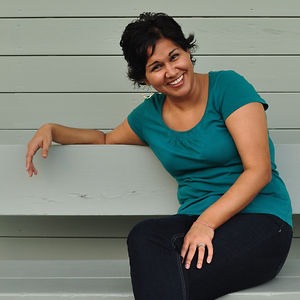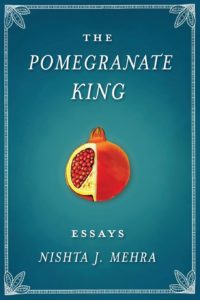 Born and raised in Memphis, Tennessee, debut author Nishta Mehra describes herself as a mix of Sourthern Belle and good Punjabi girl. She’s many other things too that can’t be captured easily in hyphenated adjectives: an award-winning food writer at Blue Jean Gourmet, a middle-school English teacher in Texas who loves her job, the daughter of Indian immigrants, a lesbian with a partner and mom to their one-year old son. Her first book, The Pomegranate King, shares multiple facets of her self in a collection of essays divided into four sections — Identity, Death, Community, and Belief — revealing a young and unique diasporic voice.
Born and raised in Memphis, Tennessee, debut author Nishta Mehra describes herself as a mix of Sourthern Belle and good Punjabi girl. She’s many other things too that can’t be captured easily in hyphenated adjectives: an award-winning food writer at Blue Jean Gourmet, a middle-school English teacher in Texas who loves her job, the daughter of Indian immigrants, a lesbian with a partner and mom to their one-year old son. Her first book, The Pomegranate King, shares multiple facets of her self in a collection of essays divided into four sections — Identity, Death, Community, and Belief — revealing a young and unique diasporic voice.
Which diaspora, though — or rather, diasporas? Many people will identify with inhabiting multiple origins and identities with grace, as Mehra does. In an introspective conversation conducted via email and edited for The Aerogram, she shares more about herself, her family and why she wrote The Pomegranate King. After the interview, read an excerpt from one of the book’s essays called “Mixed.”
You’re quite young to have written “a memoir-ish collection of essays.” Why was it important to write The Pomegranate King at this juncture?
The loss of a loved one colors your life differently, like an inkblot spreading out to cover what came right before and after. These essays capture a particular time in my life surrounding my father’s death.
I lost my dad around the same time that I was figuring out how to be an adult (I was 23 and in graduate school). This book captures a self that feels very distinct to me, and very much in the past. It’s a memoir of the project of looking at the world and my life with new eyes — figuring out how to engage with the world in the face of grief, and making sense of my life up to that point.
You explore all aspects of yourself in this collection, beginning with strong self-identification as a Southern woman from Tennessee. Do you find any one particular aspect dominating? Are they fixed, or fluid?
I think this question is so relevant to a lot of our current cultural conversations.
Growing up as a minority in school — first as one of the few non-Caucasians, then as the only out lesbian student — I became very wary of the phenomenon of being seen as representative of a particular group. I credit my parents for giving me room to be fluid with my identity, and never forcing or emphasizing one part over another. That’s an incredibly hard balancing act to pull off.
I have gone through periods in my life where one function of my identity has taken the lead and been the primary lens through which I saw the world. I remember feeling and wanting to be seen as really Indian when I was in middle school: “I’m not going to hide this difference, so why not go all the way with it instead?” That led me to pieces of my identity that I carry around with me still today. That was when I began fasting for Hindu holidays and reading Hindu sacred texts, as examples.
Then there’s the phenomenon of being new in a particular category, which brings its own enthusiasm and necessary fervor of exploration: when I first came out, or as a new mother. Those identity categories are constantly shifting for all of us.
This is what I love about the world we live in today — many of my favorite people are seeming contradictions, full of complexities and intricacies that you can’t capture with hyphenated adjectives.
 The Pomegranate King is hardly “a curry-spice-mango memoir.” Care to comment on that?
The Pomegranate King is hardly “a curry-spice-mango memoir.” Care to comment on that?
Being South Asian does not define me any more or less than any other facet of my identity. I’m not purporting to tell anyone’s stories but my own. If I’ve done my job well, they will speak to a general human experience that isn’t dependent on tropes or stereotypes.
Tell us about your family, and how they’re important to you.
Most of the people I consider my family are my family of choice, not my blood family. My mother is the only person I’m related to by blood in the entire Western hemisphere. I’m completely devoted to her, of course — but my point is that my allegiances are not constituted by being actually related.
What I’m blessed to have is a family that defies the conventional definition, but looks exactly like you would hope and want a family to look like. There’s the incredibly supportive and unconditionally loving immigrant community I grew up in, an amazing crew of friends I gathered in high school, college, and beyond, and my own little nuclear family: my partner Jill Carroll, and our son Shiv, whom we adopted almost exactly a year ago, when he was born on July 17.
It’s incredible to me now, the way that these pieces of my life fit together. If you had told me even five years ago that my mother, my son, and I would have spent Father’s Day with Jill and her extended family, all joyfully sharing dinner together, I would not have believed you.
At some point, I chose to stop compartmentalizing my life and to just live it all out loud. I was prepared for that to come with a certain cost. So to have this sense of family coming from all angles of my life — I don’t want to take that for granted.
If you could talk to your father — the Pomegranate King himself — what would you say to him?
I would thank him for showing me what a good life looked like, tell him how much I love him, and assure him that I am taking good care of my mother. That I am happy, and that I miss him.
Then I would shut up and ask to hear him sing.
Who should read The Pomegranate King?
I hope that anyone who has experienced grief will read this book and see a mirror for their experience. I hope that people with very similar and very different life circumstances than mine will read and reflect on what they’ve lived through.
The Pomegranate King is a hopeful book. It deals sharply with grief and other very real life experiences, but is ultimately about how we make meaning out of our lives: where to look, what we can create.
This is the privilege — and the responsibility — and the joy — of being human.
Lynn Ghose Cabrera lives in the Houston metro area.













1 thought on “A Conversation With Nishta Mehra, Author of ‘The Pomegranate King’”
Comments are closed.